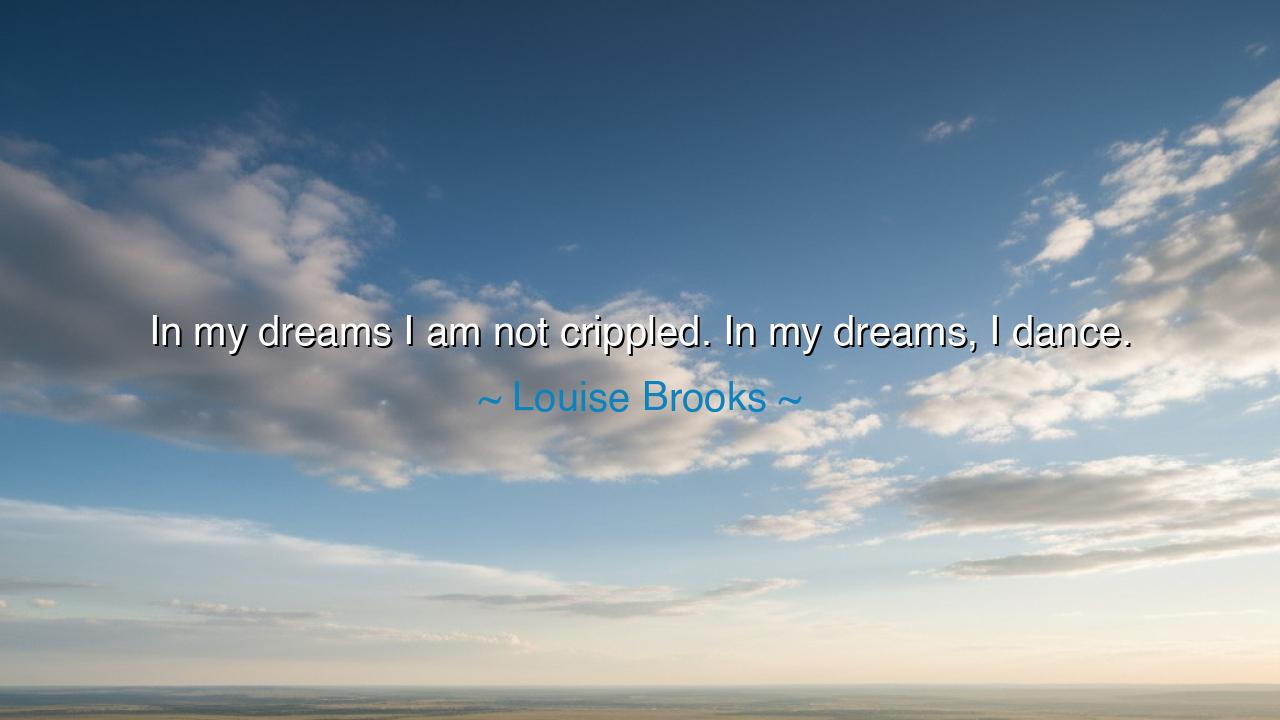
In my dreams I am not crippled. In my dreams, I dance.






In the haunting and luminous words of Louise Brooks, silent film star and philosopher of the human spirit, we find a truth that pierces through pain: “In my dreams I am not crippled. In my dreams, I dance.” This sentence, simple yet profound, is a hymn to the freedom of the soul — that part of our being which no suffering, no body, no passage of time can ever bind. Brooks, who once captivated the world with her grace and beauty on screen, speaks here not as a performer, but as a woman who has come to know the boundaries of the flesh and the limitless realm of the mind. Her words remind us that though the body may falter, the spirit remains unbroken, and that within the inner sanctum of dreams, every soul can still move with the rhythm of its truest self.
The origin of this quote is tied to the later years of Brooks’ life, when the radiance of her youth had faded and her once-celebrated body, like that of all mortal beings, had grown frail. Yet the dancer within her had not perished. In her dreams, she found again the freedom of movement, the elegance of the stage, the boundless joy of motion. Her statement is not merely about physical disability, but about the human condition itself — the inevitable truth that time and circumstance will take from us what we once held dear. But Brooks reveals something greater: that dreams are the refuge of the eternal self, the place where all that was lost can live again.
To say, “In my dreams, I dance,” is to speak of defiance wrapped in beauty. For the dream is not escape — it is remembrance, resurrection, and affirmation. The ancients understood this. The philosopher Plato spoke of the soul as a charioteer bound to a mortal body, yearning to return to its divine origin. And so, in dreaming, the soul momentarily loosens its bonds and recalls what it truly is — unshackled, radiant, alive. Brooks’s words echo this ancient wisdom. Her dancing in dreams is not nostalgia for youth, but communion with her essence — the eternal dancer, the mover that exists before and beyond flesh.
There are many who have lived this truth. Consider Stephen Hawking, whose body was imprisoned by disease, yet whose mind soared through the cosmos. He once said, “My goal is simple. It is a complete understanding of the universe.” In his physical stillness, he traversed galaxies through thought. Like Brooks, he reminds us that limitation does not define being, and that the landscape of imagination is far vaster than the reach of the body. When Brooks says she dances in her dreams, she joins that sacred chorus of souls who have found liberty not in muscle or motion, but in the life of the spirit.
And yet, her words carry not only beauty, but sorrow. There is longing in them — a tenderness for what once was, a mourning for what cannot be again in waking life. To acknowledge that one dances only in dreams is to face the truth of impermanence. But even this sorrow is dignified, for it transforms loss into art. Brooks teaches us that acceptance and imagination can coexist — that one can bow before the inevitability of time and yet refuse to let the flame of joy be extinguished. Her dreams are acts of rebellion against despair; they are a silent waltz against the dying of the light.
The lesson of Louise Brooks’s words is this: do not lament what is gone, but cherish what remains — the power to dream, to envision, to feel whole within. The world may take from you strength, speed, even sight, but your inner world is your own, untouched and eternal. Nurture it. Feed it with music, memory, and imagination. When the body can no longer run, let the mind soar; when the voice can no longer sing, let the heart hum its own melody. To dream is not to flee reality — it is to restore balance between the finite and the infinite.
So, my child of light and longing, remember the wisdom hidden in Louise Brooks’s gentle defiance. When the world confines you, turn inward and dance — not upon the earth, but within the stars of your own being. For the dream is not falsehood; it is truth revealed in silence. In your dreams, you too are unbroken, whole, radiant. And even when the body yields to time, the soul — the dancer — shall rise again, endlessly, to the rhythm of eternity.






AAdministratorAdministrator
Welcome, honored guests. Please leave a comment, we will respond soon